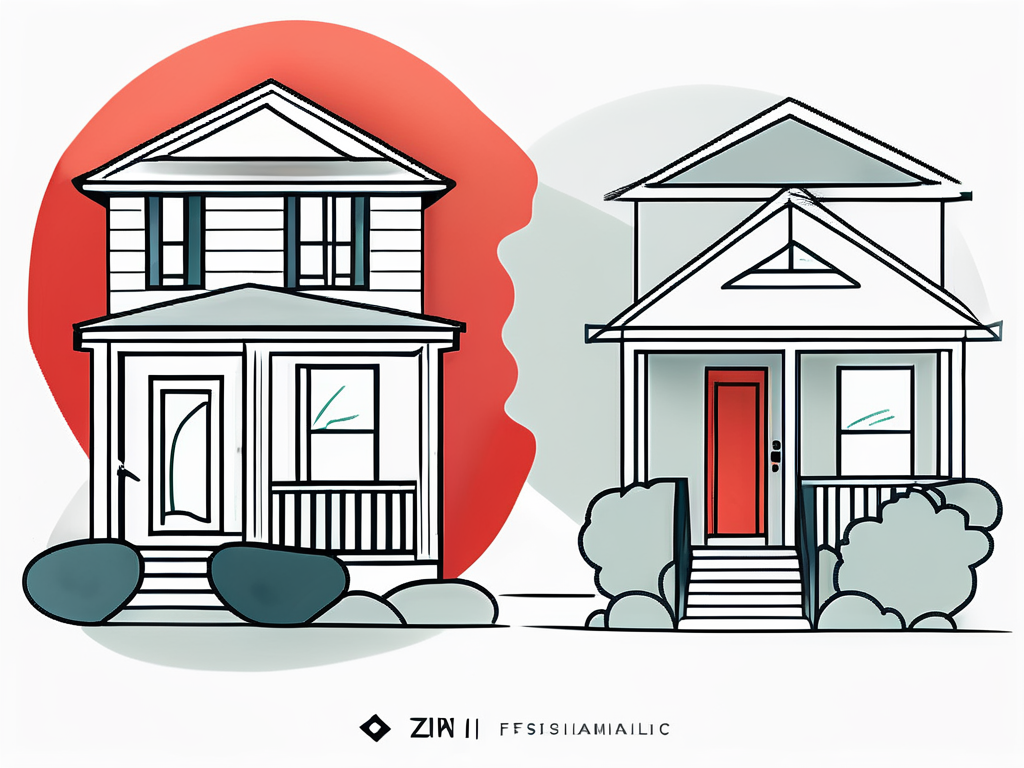Zillow vs Redfin: Comparing the Two for FSBOs

Welcome to the ultimate showdown between real estate titans: Zillow and Redfin! If you're thinking of selling your home without a real estate agent (a.k.a. For Sale By Owner or FSBO), these two platforms offer fantastic opportunities to get your property in front of eager buyers. So grab your popcorn, sit back, and let's dive into the world of Zillow and Redfin!
Understanding Zillow and Redfin
If you've ever Googled "homes for sale," chances are you've stumbled upon Zillow. This behemoth of a platform has become synonymous with real estate, allowing users to peruse listings, estimate home values, and connect with agents. Zillow was founded in 2006 by former Microsoft executives Rich Barton and Lloyd Frink. It quickly gained popularity for its user-friendly interface and innovative features, revolutionizing the way people buy and sell homes online. The platform now boasts over 110 million homes in its database, making it a go-to destination for both buyers and sellers.

Meanwhile, Redfin has been steadily making waves with its technology-focused approach, offering more transparency and lower fees. Founded in 2004 by David Eraker, Michael Dougherty, and David Selinger, Redfin aimed to disrupt the traditional real estate model by leveraging technology to streamline the buying and selling process. The company's unique business model employs salaried agents and provides buyers with a refund on commissions, setting it apart from traditional brokerages.
Key Features of Zillow
- Zestimate: Zillow's home value estimation tool. It's like giving your home a high-tech psychic reading.
- Agent Finder: Need a real estate agent? Zillow has got your back!
- Street Easy: Zillow's New York City-focused platform, because the Big Apple deserves special treatment.
One of Zillow's most controversial features is the Zestimate, an automated home valuation tool that uses algorithms to estimate a property's worth. While it can be a helpful starting point for homeowners and buyers, critics argue that it lacks the human touch and can sometimes be inaccurate, leading to disputes between sellers and potential buyers.
Key Features of Redfin
- Redfin Estimate: Redfin's take on home value estimates. It's like having your home appraised by a Sherlock Holmes fan.
- Book It: Redfin lets you schedule home tours with just a few clicks. Who needs magic carpets when you have technology?
- Hot Homes: Get notifications when a hot property hits the market. Time to practice your bidding war strategy!
Redfin's commitment to technology is evident in its innovative features like Book It, which allows users to schedule home tours online with ease. This convenience has revolutionized the homebuying process, saving both buyers and agents time and effort. Additionally, Redfin's Hot Homes feature notifies users when a desirable property hits the market, giving them a competitive edge in fast-paced real estate markets.
Analyzing the FSBO Process on Both Platforms
Now that we have a good grasp of each platform's features, let's explore how they handle the glorious world of FSBOs.

For those unfamiliar with the term, FSBO stands for "For Sale By Owner," a method where homeowners choose to sell their property without the assistance of a real estate agent. This approach can offer more control over the selling process and potentially save on agent commissions.
Listing a Property on Zillow
Zillow makes it a breeze to list your property. Simply create an account, fill out the necessary details, and upload your captivating photos. Voila! Your home is now ready to dazzle potential buyers.
One of the key advantages of listing on Zillow is its massive reach. With millions of users visiting the platform every month, your FSBO listing has the potential to attract a wide audience of interested buyers. Additionally, Zillow provides tools to help sellers determine an appropriate listing price based on market data, ensuring a competitive asking price.
Listing a Property on Redfin
Redfin offers a similar listing process but with a tech-savvy twist. Their user-friendly interface and step-by-step guidance make listing your FSBO property a walk in the park. Oh, and did we mention that you can easily manage showings and offers right from your Redfin dashboard?
Another standout feature of Redfin is its emphasis on data-driven decision-making. Sellers can access detailed analytics and insights about their listing's performance, helping them make informed adjustments to attract more potential buyers. The platform also offers a range of marketing tools to enhance the visibility of FSBO listings, such as professional photography and virtual tours.
Pricing and Fees: Zillow vs Redfin
Money, oh money! Let's talk about the nitty-gritty details of pricing and fees on both platforms—because selling your home should never leave you in financial distress!
When it comes to selling your home, understanding the pricing structures of different platforms can make a significant difference in your overall costs and profits. Let's delve deeper into the pricing models of Zillow and Redfin to help you make an informed decision.
Zillow's Pricing Structure
Zillow offers free listing options, allowing you to showcase your FSBO property to the world without spending a dime. This can be a great starting point for sellers who are looking to save on upfront costs. However, if you're looking to level up your game and gain more visibility, they also offer premium options at a cost. These premium features can include enhanced listings, featured placements, and additional marketing tools to help your listing stand out in a competitive market.
It's important to weigh the benefits of these premium options against the associated costs to determine the best strategy for your specific selling goals. By understanding Zillow's pricing structure in detail, you can make strategic decisions to maximize your home's exposure while staying within your budget.
Redfin's Pricing Structure
Redfin is known for its more wallet-friendly approach. Their listing fees are typically lower than traditional agents, giving you more bang for your buck. In addition to cost-effective listing options, Redfin also offers a transparent commission structure for buyers' agents, which can result in additional savings for sellers.
By opting for Redfin, sellers can benefit from professional representation and marketing services at a competitive price point. This can be particularly appealing for sellers who are looking to minimize their selling costs without compromising on the quality of service. Understanding Redfin's pricing structure can empower sellers to make financially savvy decisions when navigating the real estate market.
Pros and Cons of Using Zillow for FSBOs
Time to weigh the pros and cons of hitching your FSBO wagon to the Zillow train. Because let's face it, life is never all rainbows and unicorns.

When considering utilizing Zillow for your For Sale By Owner (FSBO) journey, it's essential to delve deeper into the intricacies of this popular platform. Let's explore some additional aspects that could impact your decision.
Benefits of Zillow for FSBOs
- Massive Exposure: Listing your property on Zillow means exposure to millions of potential buyers. Ready to sell your home like a boss?
- Agent Assistance: Zillow provides a platform for you to connect with local real estate agents if you ever need a helping hand.
- Valuable Metrics: Zillow offers insights into your listings' performance, giving you the power to tweak your marketing strategy and unleash your inner data scientist.
Furthermore, Zillow's user-friendly interface and robust search functionalities make it a go-to platform for homebuyers, increasing the likelihood of your property being discovered by the right audience.
Drawbacks of Zillow for FSBOs
- Competition Galore: With millions of listings, standing out from the crowd can be a challenge. Time to channel your inner creativity!
- Fake Zestimates: Zillow's infamous home value estimates, while often accurate, can sometimes make you go, "Whoa, did they use a crystal ball for this one?" Take them with a grain of salt.
- Agent Overload: While connecting with agents can be a perk, beware of the ones who swoop in with promises of gold but end up being more like leprechauns with broken GPS.
Moreover, navigating the competitive landscape on Zillow requires strategic pricing, compelling visuals, and engaging listing descriptions to captivate potential buyers amidst a sea of options. It's a battlefield where creativity and innovation can be your strongest allies.
Pros and Cons of Using Redfin for FSBOs
Now, let's shine the spotlight on Redfin and see if this platform is the secret ingredient to your FSBO success story.
But before we dive into the pros and cons of using Redfin for FSBOs, let's take a moment to appreciate the journey of selling a home. It's a rollercoaster ride of emotions, from the excitement of finding the perfect buyer to the nail-biting anticipation of closing the deal. And in this digital age, where technology has revolutionized the way we buy and sell homes, platforms like Redfin have emerged as powerful tools in the FSBO arsenal.
Benefits of Redfin for FSBOs
- Cost Savings: Redfin's lower listing fees and potential savings on buyers' agents' commissions can keep more money in your pocket. Cha-ching! Imagine what you could do with those extra dollars - a well-deserved vacation, a fancy dinner, or even investing in your next real estate venture.
- Transparent Process: Redfin's commitment to transparency means you'll always know what's going on, giving you peace of mind during the often nail-biting home selling process. No more sleepless nights wondering if your listing is getting the attention it deserves or if potential buyers are being kept in the loop.
- User-Friendly Dashboard: Redfin's dashboard makes managing your FSBO listing a breeze, giving you full control without needing a degree in rocket science. With just a few clicks, you can update your listing, track inquiries, and even schedule showings. It's like having a personal assistant, but without the hefty salary.
But wait, there's more to the Redfin story!
Let's explore the drawbacks of using Redfin for FSBOs, so you can make an informed decision:
Drawbacks of Redfin for FSBOs
- Market Reach: While Redfin is growing in popularity, its market reach may not be as extensive as Zillow's. But hey, quality over quantity, right? Redfin's focus on providing a personalized and tailored experience for both buyers and sellers means that you're more likely to attract serious and qualified buyers who are genuinely interested in your property.
- Location Limitations: Redfin's services are not available in all areas. Time to check if your region made the cool kids' list. But fear not, if Redfin isn't available in your area, there are plenty of other FSBO options out there. Don't let geographical limitations dampen your entrepreneurial spirit.
- Exclusive Redfin Buyers' Agents: If a buyer is working with a Redfin agent, they might push you to list with a traditional agent instead of going the FSBO route. Time to flex your negotiation skills! Remember, you have the power to choose how you want to sell your home. Stand firm and confidently present the advantages of a FSBO transaction, such as the potential cost savings and direct communication between buyer and seller.
So there you have it, folks! A whirlwind tour of Zillow and Redfin in all their FSBO glory. Whether you choose to go with Zillow's massive exposure or Redfin's budget-friendly approach, remember to do your due diligence, leverage the strengths of each platform, and keep your sense of humor intact. Selling a home is a journey, and with the right tools and mindset, you can navigate the twists and turns with confidence. Happy selling and may the FSBO odds be ever in your favor!





